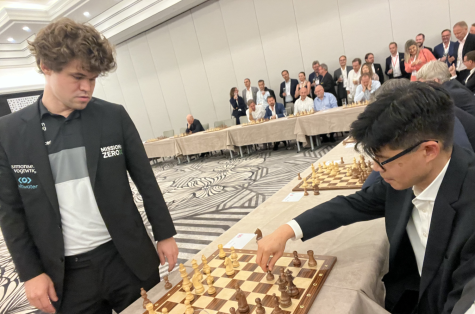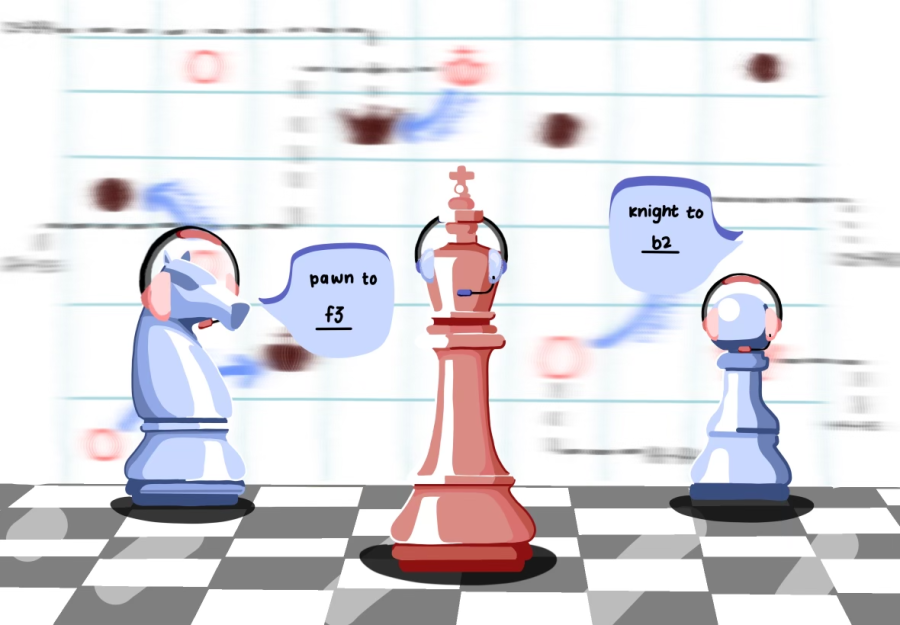Shattering the integrity of a centuries-old sport
Chess Grandmaster Hans Niemann accused of cheating in over 100 games
An illustration representing an online chess match. Online chess site Chess.com released a 72-page report on Oct. 4 accusing Chess Grandmaster Hans Niemann of unfair play in over 100 online chess games in his career.
In a sport where players take their focus and concentration to their limits, where games between professionals often last for hours on end, even a single misstep could make the difference between victory and defeat. So what happens when one of the sport’s fastest rising players is accused of using chess engines to become an omniscient powerhouse, immune to any misjudgements or errors?
Online chess site Chess.com released a 72-page report on Oct. 4 accusing Chess Grandmaster Hans Niemann of unfair play in over 100 online chess games in his career. The report came after Magnus Carlsen, World Chess Champion title holder since 2013, withdrew from the Sinquefield Cup, a prestigious 10-player tournament held in St. Louis, Missouri with over 350,000 dollars of prize money on the line, and released accusatory public statements on Twitter. In response, Niemann filed a $100 million lawsuit against Carlsen and Chess.com on Oct. 20 for the accusations.
Niemann experienced a rapid rise to prominence in recent years, performing well in over the board tournaments to achieve grandmaster status and compete in tournaments like the Sinquefield Cup. Although Niemann publicly admitted to cheating in online chess games in the past in a video interview, no definitive evidence shows that he has done so in an over the board game. The report states that Niemann cheated additionally in many more games based on his past performance and unusually rapid rise in rating. Following a Chess.com investigation, the site banned Niemann and recently removed him from participation in the Chess Global Championship, an online competition Chess.com hosts with a one million dollar prize.
“Overall, we have found that Hans has likely cheated in more than 100 online chess games, including several prize money events,” the report stated. “He was already 17 when he likely cheated in some of these matches and games.”
With computers now able to beat even the most dedicated of grandmasters, the advent of technology has ushered in a new era of chess, in which online cheating is drastically more prevalent and accessible. Sophomore Vyom Vidyarthi, a competitive chess player with a United States Chess Federation (USCF) rating of 2450 and International Chess Federation (FIDE) rating of 2400, a titled International Master, commented on the rise of chess cheating.
“Online cheating has become a big problem,” Vyom said. “It’s really easy to do, considering that computers are much stronger [chess players] than any humans. But in person, especially in these big tournaments, it’s much more complicated. It usually doesn’t come up, so it’s surprising for something like this to happen.”
The incident sparking this controversy occurred during the third round of the Sinquefield Cup on Sept. 4, when Niemann beat Carlsen using the black pieces, which move second, becoming one of the only players rated under 2700 to ever do so. Carlsen immediately withdrew from the tournament after the round, initially refusing to comment on his decision. Later, on Sept. 27, he released a detailed statement on Twitter summarizing the rationale behind his withdrawal.

“I believe that Niemann has cheated more — and more recently — than he has publicly admitted,” Carlsen wrote in the post. “I had the impression that he wasn’t tense or even fully concentrating on the game in critical positions, while outplaying me as black in a way I think only a handful of players can do.”
In his statement, Carlsen also voiced his concerns on unfair play damaging the integrity of the game, urging tournament officials to enforce security measures and cheating detection in over the board settings. Chess Club advisor Chris Gatto echoes Carlsen’s sentiments of dealing with cheating’s increased prevalence.
“[Cheating’s] gone as far as certain players having a buzzer giving them signals or having an outside observer give them a signal of what the right move would be,” Gatto said. “It’s interesting because when I played competitive chess in high school, there were no real rules regarding where you could go or when you could use cell phones during tournaments. Cheating at that time wasn’t something that was policed in any way, but it sounds like now there might have to be stricter regulations.”
Additionally, Carlsen also resigned to Niemann after moving just once in a separate game during the online Julius Baer Generation Cup on Sept. 19, fully establishing his stance on the prior scandal and emphasizing his belief to the public that Niemann had cheated.
“I think Carlsen [is] trying to make more of a symbolic statement by resigning after one move, and I think he achieved his goal of just trying to bring attention to the issue,” Gatto said. “Going forward, I don’t know if resigning would be an appropriate action, but it seems like in this case Carlsen did it to garner attention and was successful.”
While Chess.com banned Niemann from their site and future online tournaments, FIDE has not found any evidence of his cheating in over the board events. Despite the lack of evidence, public opinion has turned against him. Niemann’s $100 million defamation lawsuit on Oct. 20 states that Carlsen, Chess.com, its chief chess officer Daniel Rensch and grandmaster Hikaru Nakamura jeopardized his chess career with their discussions of his alleged cheating. Since their accusations were made public, Niemann says, scheduled games have been canceled and he has been removed from several prestigious tournaments.
“Online, where it’s been proven to as much certainty as we can that [Niemann has] been cheating, it’s good to restrict him from tournaments,” Chess Club president Atri Banerjee (12) said. “But in person, the only thing they can do is try to improve anti-cheat measures, but continue to let him play because [he is] innocent until proven guilty. I think we just have to continue with the assumption he’s innocent.”
According to Niemann and the lawsuit, the defendants have caused “devastating damage to his reputation, career and life.” Although there has been no public response to the lawsuit, the case will most likely go to court in the following months. Atri views the lawsuit and the possibility of cheating as formative to the future of chess.
“It’s pretty much an existential threat to the game,” Atri said. “If everyone’s cheating in chess, there’s no way to truly enjoy the game for what it is and learn and grow as a person. I think cheating is the most serious issue in chess.”

Edward Huang (12) is a co-managing editor for the Winged Post, and this is his fourth year on staff. This year, Edward wants to continue creating unique...

Felix Chen (11) is the co-news editor for Harker Aquila and the Winged Post, and this is his third year on staff. Felix hopes to diversify this year's...

Ananya Sriram (12) is a co-managing editor for the Winged Post, and this is her fourth year on staff. This year, Ananya hopes to bond more with members...


















![“[Building nerf blasters] became this outlet of creativity for me that hasn't been matched by anything else. The process [of] making a build complete to your desire is such a painstakingly difficult process, but I've had to learn from [the skills needed from] soldering to proper painting. There's so many different options for everything, if you think about it, it exists. The best part is [that] if it doesn't exist, you can build it yourself," Ishaan Parate said.](https://harkeraquila.com/wp-content/uploads/2022/08/DSC_8149-900x604.jpg)




![“When I came into high school, I was ready to be a follower. But DECA was a game changer for me. It helped me overcome my fear of public speaking, and it's played such a major role in who I've become today. To be able to successfully lead a chapter of 150 students, an officer team and be one of the upperclassmen I once really admired is something I'm [really] proud of,” Anvitha Tummala ('21) said.](https://harkeraquila.com/wp-content/uploads/2021/07/Screen-Shot-2021-07-25-at-9.50.05-AM-900x594.png)







![“I think getting up in the morning and having a sense of purpose [is exciting]. I think without a certain amount of drive, life is kind of obsolete and mundane, and I think having that every single day is what makes each day unique and kind of makes life exciting,” Neymika Jain (12) said.](https://harkeraquila.com/wp-content/uploads/2017/06/Screen-Shot-2017-06-03-at-4.54.16-PM.png)








![“My slogan is ‘slow feet, don’t eat, and I’m hungry.’ You need to run fast to get where you are–you aren't going to get those championships if you aren't fast,” Angel Cervantes (12) said. “I want to do well in school on my tests and in track and win championships for my team. I live by that, [and] I can do that anywhere: in the classroom or on the field.”](https://harkeraquila.com/wp-content/uploads/2018/06/DSC5146-900x601.jpg)
![“[Volleyball has] taught me how to fall correctly, and another thing it taught is that you don’t have to be the best at something to be good at it. If you just hit the ball in a smart way, then it still scores points and you’re good at it. You could be a background player and still make a much bigger impact on the team than you would think,” Anya Gert (’20) said.](https://harkeraquila.com/wp-content/uploads/2020/06/AnnaGert_JinTuan_HoHPhotoEdited-600x900.jpeg)

![“I'm not nearly there yet, but [my confidence has] definitely been getting better since I was pretty shy and timid coming into Harker my freshman year. I know that there's a lot of people that are really confident in what they do, and I really admire them. Everyone's so driven and that has really pushed me to kind of try to find my own place in high school and be more confident,” Alyssa Huang (’20) said.](https://harkeraquila.com/wp-content/uploads/2020/06/AlyssaHuang_EmilyChen_HoHPhoto-900x749.jpeg)



